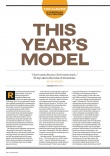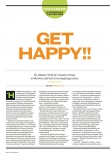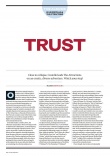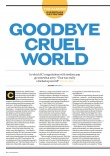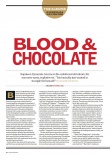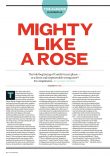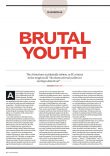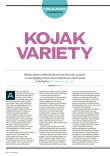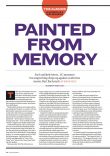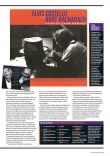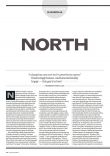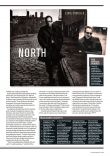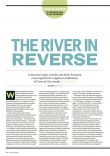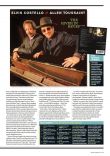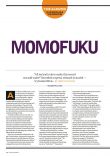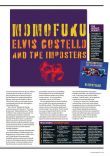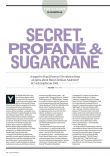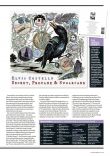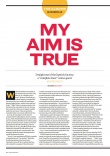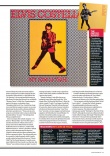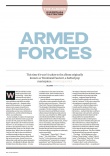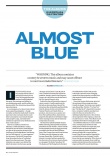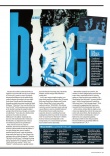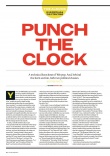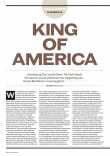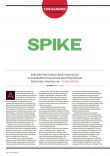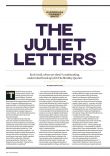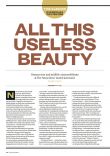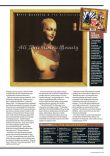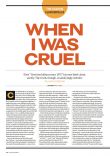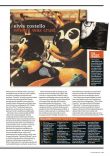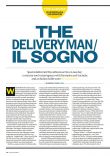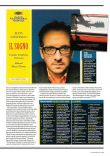Uncut
Ultimate Music Guide
|
—
|
Tape recorder on, is it?
Uncut
The musical adventures of Elvis Costello: how an angry young man and new wave poet became one of Britain's finest songwriters
|
To the new wavers of 1977, Elvis Costello must have looked a straightforward proposition, a black and white world. Punk's febrile, combative energies and the naïve excitement of golden age rock 'n' roll and mod beat encapsulated in one bespectacled, legs-akimbo, skinny-tied package. And so, for a short while, it would prove; as the arrival of The Attractions — and a pill-popping angry young man attitude — powered Costello on to the new wave front lines with This Year's Model and Armed Forces, his aesthetic cohered around barbed and allusive dissections of pop culture, cutting social commentary and the politics of love and war. A critical darling, and not just because, as Dave Lee Roth bitterly attested, the sleeve of Model was, for most journalists, like looking in a mirror.
In the 148 pages of this Deluxe Ultimate Music Guide, fully updated to account for his most recent activity, you'll read some of Costello's most memorable interactions with just those journalists. Here you'll find spiky moments — "Getting it all down, are you?" — and expansive encounters. Not to mention a full reckoning of the many recordings, collaborations and other adventures which caused them to occur in the first place.
Costello's tale began to twist early on, and never reverted to formula for 40 years. Get Happy!! arrived drenched in classic soul and R&B, looking like it'd been dusted off from the basement of the Twisted Wheel. A country album emerged, Almost Blue, fresh from Nashville itself. A swerve into lush, occasionally baroque art pop for Imperial Bedroom; another into brassy '80s pop for Punch The Clock, home to some of the finest deep cuts in alt.rock history in "The Invisible Man" and "Charm School." The untamed unpredictability of Elvis Costello came to a head in 1986, the year he both premiered the beard on the sleeve of The Costello Show's immaculately authentic country collection King Of America and arguably invented grunge on his unhinged junk rock masterpiece Blood & Chocolate, introducing his Machiavellian alter-ego and ringmaster of the Spinning Songbook tours, Napoleon Dynamite.
Since then there have been Celtic Beard Years, classical quartet collaborations, meetings of minds with the pop, blues and hip-hop greats, torch song collections, experimental electronic endeavours, country and jazz departures and plenty else besides. Costello has evolved from new wave's sharpest rebel poet into a sonic polymath and onstage raconteur, not just one of the country's finest songwriters but amongst its most adventurous too.
Throughout the decades, though, Costello has retained the will and ability to reconnect with that core punk attitude and fire out a firecracker rock record when the mood takes him — a Brutal Youth, a When I Was Cruel, a Momofuku. It's been a skewer holding together a career that might otherwise fly off in a dozen directions, and spears through his most recent run of albums too in the shape of the cranky, incredible The Boy Named If.
An amazing journey for this Jack of all parades, then, and one comprehensively tracked through these pages. We hope you're happy now...
|
This Year's Model
Neil Spencer
"I don't wanna kiss you, I don't wanna touch..." EC lays down the rules of Attractions.
|
Released just eight months after his debut, This Year's Model proclaimed an altogether different pop animal to the geeky songwriter of My Aim Is True. Its cover portrayed Costello not as oddball wannabe but as young meteor, poised behind a Hasselblad camera, pulling the strings, in control. The music had taken on an equally dramatic shift with the recruitment of The Attractions, whose well-schooled talents had slotted together cannily during 1977's frenetic gigging. In the studio, with producer Nick Lowe on inspired form, the quartet emerged with a record that sounded like no-one else, a masterpiece that alchemised Costello from aspiring songwriter to fully formed creator. Hereafter he was a player.
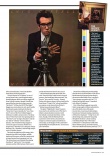 The change was not altogether unexpected. "Watching The Detectives" had already crashed the charts, and though Costello was not himself punk, the anger, confrontation and self-lacerating honesty of his songs, together with the absolute fury of his live shows, slotted sweetly into the mayhem of 1977. On or offstage, there was no spikier presence in town.
Few, however, had anticipated an album as startling and focused as This Year's Model. Sonically, it was utterly distinct. Whatever its sentiments, the punk revolution was founded on guitar rock, and while Costello's Fender is a driving presence here (see the opening splash of power chords on "No Action"), the album is defined by the insinuating whine of Steve Nieve's Vox Continental — an instrument wildly out of favour since its 1960s heyday — and by the booming precision of a rhythm section that Lowe made the centrepiece of his mix. The results could be Spectoresque in their onslaught ("Pump It Up"), slide into jangle pop ("Lip Service") or turn mysterioso psych with a flick of Nieve's keys. At the record's heart was Costello himself, unleashing a torrent of acidic wordplay on a dozen songs that were each distinct but whose sprays of imagery bled into each other. Thematically, This Year's Model is virtually a concept album, summed up by two words: woman trouble.
And what trouble. The sneered opening lines — "I don't wanna kiss you, I don't wanna touch" — were the antithesis of gooey pop tradition, though elsewhere Costello mutated from anti-romantic ("I don't want anybody saying you belong to me") to embittered loser ("Knowing you're with him is driving me crazy"), sinister stalker ("I'll be at the video and I will be watching") and passionate suitor ("It's you, not just another mouth in the lipstick vogue"). Emotionally, This Year's Model's withering put-downs and proclamations of passion make for a contradictory but electrifying ride through modern romance. Presciently, telephones play a big part in the narrative, with Costello either waiting on a call or ranting down a mouthpiece while claiming that he's "not a telephone junkie."
Curiously, for an album that screamed modernity (Barney Bubbles' graphics emphasised the point), This Year's Model has a strong 1960s streak. While its deliberately miscropped cover evoked David Bailey (and David Hemmings in Blow-Up), the gangster persona of "Hand In Hand" is pure Kray Twin (and Harry Flowers in Performance). Its Vogue cover models and the Chelsea Costello has no desire to visit belong not to King's Road 1977, but to the chi-chi West London of a previous era. For most pop writers, the catwalk had long since ceased to hold any fascination; despite the protests that "you don't really give a damn about this year's girl," Elvis seemed fixated, "Out in the fashion show / Down in the bargain bin."
"I Don't Want To Go To Chelsea" is one of several stand-outs, a snarl against empty-headed glamour built on an itchy reggae riff from Costello's guitar, though Costello has mused that he was also trying to rewrite The Kinks' "All Day And All Of The Night." Reggae was everywhere in 1978, and Costello had already used a laid-back rhythm for "Detectives" (and, clunkily, for "Less Than Zero"), but on This Year's Model reggae's influence is subtler, yet pervasive. The drop-outs of "This Year's Girl," the opening riffs of "The Beat" and "Living In Paradise" and the neo-dub of "Chelsea" all owe a debt to Jamaica. The switch from edgy reggae to cavernous pop is constant, whether in a single song ("The Beat") or in the gear change between, say, "Paradise" and the high-tempo rock of "Lipstick Vogue."
The clever architecture of the songs, their dramatic key shifts into bridges, middle eights and choruses, called for a musicianly acumen beyond most emergent acts, but The Attractions never faltered (the singing bassline of "Lip Service," for example, remains worthy of McCartney). Nick Lowe's production likewise doesn't miss a trick — the backward tape that opens Side Two with "Hand In Hand" adds a touch of psych menace, the handclaps that punctuate "Lip Service" give a nod to '60s pop — though Basher also knows when to sit back and let the band rip on "Pump It Up," whose breathless, accusatory vocals bear a hint of Dylan's "Subterranean Homesick Blues."
The glum "Night Rally" doesn't seem to have much to do with the rest of This Year's Model, a musical plod at variance with the melodic cavalcade elsewhere. At the time, though, with the National Front a presence on the streets, its anti-fascist imagery carried an urgency that finds an echo today, as do images of "the corporation logo flashing on and off in the sky." A necessary piece of ballast.
Beyond its exhilarating musicianship, what do the lyrical flourishes of This Year's Model amount to beyond a man deep in the most troubled kind of love, one that's "just a tumour, you gotta cut it out"? ("I wished he liked girls more," remarked critic Robert Christgau).
Part of the album's appeal was and is that its songs apply ruthless authenticity, one of the battle cries of the punk insurrection, to personal relationships. So jealousy, betrayal, longing, repulsion, self-hatred, vengeance — bring 'em on. It's about being real, instead of "just going through the motions," about wanting something deeper than "those disco synthesisers" or the phoney world of the latest celebrity pin-up. In modern times, This Year's Model still chimes perfectly.
|
|
Get Happy!!
Jim Wirth
Hi, fidelity? Why EC's frantic tribute to Motown and Stax is no laughing matter.
|
"He drinks in self defence," Elvis Costello sings on "Temptation," a fair indication of the point his life had reached in the months leading up to Get Happy!!. Recorded in October 1979, Costello's uneasily cheery pastiche of Motown and Stax has a lighter tone than its immediate predecessors, with the quirky sleeve's integral ringwear designed to make the package seem like some well-thumbed 1965 Tamla release. However, it is all a cosy blanket covering an uneasy, and occasionally dissolute mess, smart lines sparkling in deep and muddy emotional waters.
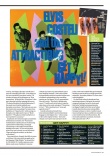 "Dying to be so bad is bad enough," sings Costello, voice worn ragged on Get Happy's wearily defiant closer, "Riot Act." "Don't make me laugh by talking tough." Costello's attempts at acting the big man, of course, had led to substantial problems. Goaded to no small extent by tough-guy manager Jake Riviera, who had actively encouraged the siege atmosphere that surrounded the singer as he broke America, Costello was reluctant to be an easy commodity. As he had growled on stand-alone 1978 single "Radio, Radio," a hate-letter to the music business: "I wanna bite the hand that feeds me / I wanna bite that hand so badly."
He duly bit off substantially more than he could chew after a show in Columbus, Ohio on March 15, 1979, a drunken spat with members of Stephen Stills' entourage — and particularly Bonnie Bramlett, once of Delaney & Bonnie fame — descended into a fight.
Beset with death threats and a radio black-out, Costello showed contrition at a New York press conference on March 30, 1979. "Nobody said that to make records you've got to have a certificate that says you're a nice and wonderful person," he said, struggling to maintain some dignity. He has been apologising ever since. This in 1982: "I said the most outrageous thing I could possibly say to [the Stills party] — that I knew, in my drunken logic, would anger them more than anything else." Then a lifetime later in 2010: "I thought [I] was being ironic," and again, "Despite everything else that I've stood for, that's still mentioned."
Many read the affection for soul music expressed on Get Happy!! as a musical act of penitence, but the lessons in humility are seemingly more to do with his well-publicised dalliance with November 1974 Playmate Of The Month Bebe Buell, and the uneasy reconciliation with first wife Mary Burgoyne. A 25-yearold father and husband, Costello's discovery — expressed on unflattering third-person pen pic "The Imposter" — that he is "not the man you think that he could be" is everywhere. A sense of inadequacy underpins Get Happy!!, along with the feeling that he has simultaneously underpaid for and been short-changed by love.
Opening pun fiesta "Love For Tender" sullies human emotion with the language of high finance, and finds Costello very much in arrears: "You can total up the balance sheet, and never know if I'm a counterfeit," he sings over a chirpy, finger-clicking backdrop. His fakery is further exposed on the uptempo "The Imposter," the protagonist "Dying to be too bad, trying to talk too tough, trying to jack the lad." Trying, and notably failing.
Bewitched and utterly bewildered by the "double duchess" he encounters in "New Amsterdam," Costello finds his career capital also loses a lot on the foreign exchanges. "Back in London they'll take you to heart after a while," he muses. "Though I look right at home, I still feel like an exile."
In a world — or indeed a continent — where insincere compliments are seemingly easy to come by, Get Happy!! plunges Costello into a quest for something like truth. "Everything you say now sounds like it was ghost-written," he wonders in horror of his paramour on "New Amsterdam." While his idiot "King Horse" alter ego is besotted with the trappings of success ("So fond of the fabric / So fond of fabrication"), the newly wise Costello suddenly sees deception everywhere. "Her bedroom eyes were like a button she was pushing," he notes of one bedfellow on "Opportunity," while seeing sex through a one-night stand's eyes on "Motel Matches": "Though your mind is full of love, in your eyes there is a vacancy."
Inauthentic love is bad enough, but authentic lovelessness is no better. On "Possession," Costello paints a joyless picture of a decaying cupboard-love relationship, seemingly culminating in a last night at home before heading out on tour: "So I see us lying back to back, my case is closed, my case is packed / I'll get out before the violence, or the tears, or the silence."
Extra-marital sex, though, does little to warm a cold heart. His voice utterly ravaged on the bed-hopping "High Fidelity" (or should that be 'Hi, Fidelity'?), Costello expresses some hollow-eyed sense of adulterer's remorse ("Maybe I got above my station, Maybe you're only changing channels"), but a more selfish disappointment with the essential architecture of romantic relationships is the overriding emotion on Get Happy!!. It's all compromised. None of it works. "Everybody's hiding under covers," Costello wails as he looks to wipe the slate clean on the under-eulogised "Clowntime Is Over." "Who's making Lovers' Lane safe again for lovers?"
Costello unburdens himself of an intercontinental flight's worth of emotional baggage on Get Happy!!, but — with 10 songs a side on the original version — fast scene changes cover up for any sameyness in the action, with some unbelievably good material flashing in and out of focus at high speed (the enigmatic "Secondary Modern" is a less-noted career highlight).
It is the album where he abandoned any remaining pretence of being in the musical vanguard, perhaps, but as his "post-punk Bob Dylan" bubble burst ignominiously, Get Happy!! might be the first record where Costello dared to show some vulnerability. No longer so big or so clever, Costello's usual wisecracking fury takes a stylish turn towards a more modest sense of self-awareness. Not necessarily authentic soul music, but music with a genuine soul.
|
|
Trust
Bud Scoppa
Close to collapse, Costello leads The Attractions on an erratic, diverse adventure. Watch your step!
|
One man's hodge-podge is another man's White Album. A close examination of Trust, a third of a century after its release, indicates that it is neither the awkward misstep some perceived it to be at the time, nor an overlooked masterpiece, as revisionists have pronounced it to be in retrospect. Among the 14 tracks are a handful of subpar songs by Costello's standards, still valuable thanks to the tautness and invention of The Attractions, at the peak of their powers. But Trust also contains some of the finest songs Costello has ever written, brought to life by flights of vocal brilliance and jaw-dropping instrumental interaction.
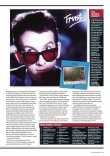 In the fall of 1980, Costello, Nieve, the Thomases and producer Nick Lowe began work on their fourth collaboration, no doubt hoping to add to their streak of instant classics. Once again, the prolific Costello had prepared a bounty of new material, drawing inspiration from the macro (the new, repressive political climate of the Thatcher regime) and the micro (his unravelling marriage), while also cherry-picking bits from a sheaf of notes and partly written pieces the 26-year-old artist had been accumulating since his late adolescence.
Given the pressure they were clearly under to deliver the goods yet again, it seems odd that the principals chose to abandon London's Eden Studios, where they'd made all of their previous magic together, in favour of Dick James' DJM Studios, whose tracking room had a strikingly different sonic character to Eden. It was "drier," "tighter" and "less live," in the parlance of recording engineers, as they soon discovered, and as several tracks contained on the bonus disc of the 2003 Rhino reissue illustrate. The band and Lowe's inability to get the sounds they were going for ramped up their frustration to unprecedented levels and led them back to Eden to cut the bulk of the album.
A stylistic potpourri, Trust refuses to stay in one place for long, looking backward one moment and forward the next. "Lovers Walk" and "Strict Time" continue Get Happy!!'s R'n'B-derived propulsiveness, and "Different Finger" anticipates the following country set Almost Blue, while the ballads "You'll Never Be A Man," "Shot With His Own Gun" and "Big Sister's Clothes" exhibit the baroque intricacy of Imperial Bedroom. Less obvious moves, according to their author, involved the nipping of bits from such contemporaries as The Police ("Clubland"), The Pretenders ("Clubland" again) and XTC ("White Knuckles"). Costello, though, may well have been putting us on —apart from the also acknowledged, more readily apparent rub-off from his mates in Squeeze, as evidenced in the Glenn Tilbrook co-starring "From A Whisper To A Scream" and the Chris Difford-like lyrical detail in "Fish 'N' Chip Paper." (In 1982, Costello would return the favour, guesting on Squeeze's "Black Coffee In Bed").
While the most illuminating evaluations of Costello's records are Costello's own 2002 notes, which enriched the Rhino reissues, the reader must bear in mind that he frequently sells himself short in the interests of self-mockery and the desire to amuse. Nonetheless, considering the excesses that characterised that wild and woolly era, there's no reason to doubt his oft-quoted description of Trust as "easily the most drug-influenced record of my career," or that "It was completed close to a self-induced nervous collapse on a diet of rough 'scrumpy' cider, gin and tonic, various powders, only one of which was 'Andrews Liver Salts,' and, in the final hours, Seconal and Johnnie Walker Black Label." In light of this confession, the impish grin on Costello's face on the cover portrait comes off as comically ironic.
Trust, though, has its share of undeniably brilliant passages, none better than the tandem of "Watch Your Step" and "New Lace Sleeves." Properly placed alongside each other precisely in the middle of the sequence, the two songs are fraternal twins in several respects. Costello had started them six years earlier when he was 20, prior to My Aim Is True, making them the oldest on the LP. The echo-free, close-mic'd vocal sound matches the bone-dry recording, and Nieve's overdubbed, Jamaican-dub-inspired melodica flourishes further integrate their elegant feel. In addition, the two lyrics are embedded with drop-dead-gorgeous turns of phrase, like the delectable near-rhyme "And you're drinking down the Eau de Cologne/ And you're spitting out the Kodachrome," from "Watch Your Step" and the memorable set-up of "New Lace Sleeves," which Costello croons in blubber-lipped fashion, like a new wave Bing Crosby: "Bad lovers face to face in the morning/ Shy apologies and polite regrets/ Slow dances that left no warning of/ Outraged glances and indiscreet yawning/ Good manners and bad breath get you nowhere." That's as good as it gets — a movie in five lines.
What's more, as a showcase for The Attractions, Trust has few equals. Among the numerous high points are Pete Thomas' systematic pulverising of his drumkit in the brutally visceral yet perfectly controlled "Lovers Walk"; Bruce Thomas' hyper-melodic, McCartney-esque lead bass on "Clubland," "Strict Time" and throughout; Nieve's eloquent song-serving piano work on "You'll Never Be A Man" and "Shot With His Own Gun." It's the ensemble's raging groove on "From A Whisper To A Scream" that delivers the album's most hair-raising contrast when it erupts on the stately heels of "New Lace Sleeves," with the slashing guitar riffs of The Rumour's Martin Belmont matching Tilbrook and Costello's conjoined vocal urgency.
At the other extreme, The Attractions rescue the throwaways "Luxembourg" and "Fish 'N' Chip Paper," seamlessly fusing Sun Records rockabilly and hardcore punk on the former and animating the latter's flatness with their jaunty interplay. By the same token, they give odd-song-out "Different Finger" a reason for inclusion, by expertly impersonating a combo of stone-country Nashville cats.
Trust might not have been relatively undervalued in the canon had it yielded a hit (strangely, "New Lace Sleeves," clearly its standout track, was never released as a single), and it might've been more highly regarded had it been edited down to a compact 11-song set. As released, the album is a mixed bag, but its pleasures are many, its baseline is sturdy and its peaks are towering indeed.
|
|
Imperial Bedroom
Jon Dale
The boy with a problem reaches a kind of maturity. Baroque, Beatlesy, but still uncompromisingly visceral.
|
Talk about great expectations. For their promotional campaign for Elvis Costello & The Attractions' 1982 album Imperial Bedroom, Columbia Records advertised the record with a simple tagline: "Masterpiece?" That question mark is the (doubtless unintentionally) telling moment. Critical reception of Imperial Bedroom was mixed but mainly positive; its two singles didn't do particularly well, but the public took to the album, sending it Top to in the UK. And yet Costello himself would come out, later, criticising the songs, telling Rolling Stone in the late '80s, "Some of the songs are just not written well enough," that they often were too "vague" and "theoretical."
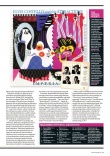 It was the first time Costello's own songs had been produced by someone other than Nick Lowe, another step outside the familiar, outside the psychological confines of the Stiff Records clique (Lowe wouldn't return to the Costello producer's chair until 1986's Blood & Chocolate). Instead, Costello called in Geoff Emerick, perhaps best known for his engineering work on The Beatles' Revolver, Sgt Pepper's Lonely Hearts Club Band and "Strawberry Fields Forever." Emerick would also follow through some of Paul McCartney's solo career, including co-production and engineering of Band On The Run and Tug Of War, which he was engineering concurrently with the Imperial Bedroom sessions. In short, Emerick had good form.
Imperial Bedroom was also the first set of original songs that Costello had brought to the studio without road testing them first, which might account for the stylistic leaps that he takes within the album: even, with the dislocations of "Man Out Of Time," within the songs themselves. That song carves its material out of several temporalities, with the beginning and ending dropped in from an earlier, rockier version, recorded on eight-track during demo sessions for the album. Tearing up the song with idiot energy, the feverish drive of the demo "Man Out Of Time," all clanging guitar and raucous screams, was spliced out of the original and cut into the top and tail of the studio recording, Costello says in his liner notes, "to break with the mood of the surrounding tracks."
It's a fair observation — if Imperial Bedroom suffers from anything, and it's a minor complaint, it's an occasional longueur, a settling into mood that, rather than helping narrate a coherent story for the album in toto, can have it feeling slightly ponderous. If anything, such an approach could have been better served breaking up other parts of the album. As it is, the escalating fervour of the studio "Man Out Of Time" sits beautifully next to the piercingly gentle "Almost Blue," its jazz-ish modality cut from the same cloth as "Shipbuilding," the song Costello had recently co-written with Clive Langer for Robert Wyatt, but with that song's political edge replaced with interpersonal autopsy. And is that an echo of one of Costello's earlier, best-known songs, in the line, "there is part of me that's always true, always"?
Reeling back to the start of the album, "Beyond Belief" shares similar psychological space with "Almost Blue," though Costello's grappling with mortality ("you'll never be alone in the bone orchard") and cruelty has a much more tart edge. Here he's also playing with his voice, treating it as yet another piece of sonic material to be cut and pulled, moving into strangely windy, reedy falsetto, leaping into a distortion chamber for emphasis, or towards the end of the song, corralling multiple Costellos as the group recede out of view. "Tears Before Bedtime" follows suit, with Costello leaping between octaves like no-one's business; it's a strange, disconnected song, not really telling of the strengths of Imperial Bedroom.
From there, though, the album is on the ascendant, moving through the chilling dissections of "Shabby Doll," the thrilling, previously mentioned "Man Out Of Time" (a great example of The Attractions' simpatico approach, able to build emotional architectures from their ensemble playing that buttress and bolster Costello's voice and lyrics). By the time of "...And In Every Home," where Costello and Nieve bring in a 40-piece orchestra, it's clear that, with Imperial Bedroom, Costello's taking his greatest strides, in terms of arrangement, risking some of the material in the process, but often with great, surprising outcomes.
"...And In Every Home" is a puzzling, but lovely song. While the arrangements contain references to George Martin's work for The Beatles, if anything, Nieve's charts have the same voluptuous, voluminous splendour as Van Dyke Parks' arrangements for his own Song Cycle and Discover America albums. Like those, there's an almost rococo approach to the orchestration, using the nuance of the orchestra to its greatest, going for playful touches that can suddenly turn, on a dime, to moments of great pathos, like the drone bed that swells as Costello's voice disappears into the silence at the end, repeating the song title.
From there, Imperial Bedroom quickly slides through a series of two-minute songs that play out further as an index of possibilities, enjoyable but not quite fully realised — "The Loved Ones," "Human Hands," "Kid About It" — before the album rallies with the heartbreaking "Boy With A Problem," where Costello passes the lyrical baton to Squeeze's Chris Difford. The album's lead single, "You Little Fool," starts to wind the set down, Costello again twisting his vocal performances around the song's rattling spine, some seriously baroque harpsichord touches and ill-advised flanging — well, it was the '80s — serving as dislocating forces, complications, before "Town Cryer" closes the album.
While Costello's said that many of the lyrics for Imperial Bedroom played characters, you can't help but hear the lyricist's own psychology in "Town Cryer"'s loser pathology, Costello squeezing "I'm the town cryer... I'm a little down/ With a lifetime to go" out of his body, before, towards the very end, sighing about being "Just a little boy lost in a big man's shirt." Rallying after a couple of years of performative excess, mutual antagonisms, sideways moves and confusing 180-degree spins, with Imperial Bedroom, Costello took stock to figure out where he was headed. It's maturity, in other words, but the real deal, with all of the confusions and agonies of real life bleeding from the songs.
|
|
Goodbye Cruel World
Luke Torn
In which EC's negotiations with modem pop go somewhat awry: "That was really a fucked-up record!"
|
Chances are, despite Elvis Costello's enormous capacity for irony and vitriol, even he didn't mean for the title of his ninth album to be such a personal prophecy. Nonetheless, the wicked series of events swirling around him as summer 1984 beckoned — the final disintegration of his 10-year marriage, financial strife verging on bankruptcy — resulted in the release of Goodbye Cruel World, essentially the bitter end of Elvis' first golden era. By the time he regained his artistic footing, shedding longtime co-conspirators The Attractions, writing and touring with both T Bone Burnett and The Pogues, he was taking on a passel of noms de plume (take a bow, Howard Coward). He had all but buried "Elvis Costello."
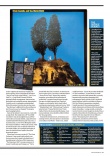 But, as they say, it seemed like a good idea at the time. "Everyday I Write The Book," the catchy, snap-step single from Cruel World's predecessor Punch The Clock, returned Costello to the charts in a big way in 1983, recasting punk's most eloquent angry voice as among the new-fangled crop of MTV pop hopefuls. The escalated game of chart sweepstakes required a suitable follow-up. "The Only Flame In Town," a slinky slice of faux R&B, replete with supper-club horns, cooing vocals and blue-eyed-soul superstar Daryl Hall on harmonies, was Costello's response. Ultimately, the song may have skimmed the realm of the popular, but it was a million miles from the pure chutzpah, revved-up guitars and emotional bloodbath of, say, "(I Don't Want To Go To) Chelsea."
Returning to the Punch The Clock production team of Clive Langer and Alan Winstanley, Costello was, albeit amid personal distress, permitting commercial interests to dictate artistic direction. On the surface, though, these seemed to be sensible moves. His new compositions sported pop hooks aplenty — once exposed, just try forgetting the carnivalesque, off-kilter (Madness-like?) melody of "Room With No Number." But in the context of Costello's contrarian artistry, especially the blunt-force trauma and prickly personal politics of his best work, one couldn't help but see Goodbye Cruel World as a misguided turn toward the trendy or the gauche. Or, as Elvis himself, as his own worst critic, would more succinctly state...
"That was really a fucked-up record. That's the worst one, really," he barked to journalist Nick Kent later, part of a series of self-denigrations on Goodbye's mere existence, "because I had all the arrangements arse-backwards, picked the wrong producers, then asked them to do an impossible job..."
Costello later revealed that his favourite record at the time — naturally — was Richard and Linda Thompson's break-up spectacular Shoot Out The Lights and that, briefly, he considered giving Sir Thompson a call to play guitar on Goodbye Cruel World. The prospect raises visions of a dark, intense folk-rock record of broken-heartedness, an amped-up, post-punk Blood On The Tracks. In fact, a wild, rollercoaster-ish Blonde On Blonde-style take of "I Hope You're Happy Now," later revamped for Blood & Chocolate, and a bone-chillingly stark cover of Thompson's "Withered And Died" (among a raft of raw, sometimes acoustic demos and bonus tracks on Goodbye's subsequent expansions) hint at what a true-to-vision Cruel World might have sounded like.
All of which is to say, Costello's muse was hardly off in the ditch, as is often presumed. Just that the recorded evidence reveals a mismatch: material at cross-purposes with presentation; fuzzy or overly busy arrangements at cross-purposes with mood, purpose and lyrical intensity. Still, working through regret and guilt, anger and desperation, intermittently grasping at the shards of his broken marriage, Costello came up with a core repertory. "Home Truth" might be the most heart-ripping cut — think a quirky riff on The Righteous Brothers' "You've Lost That Loving Feeling" — but "Love Field" is Cruel World's stunner. With its pulsing balladic arrangement, interweaving keyboards and a suitably present, impassioned Costello vocal, it catalogues a relationship's bit-by-bit erosion, from true love to who cares: "You think you're different from the rest/ But you don't know how you've changed," he sings in pure hangdog fashion.
Some of the album's cuts, however, crash with an ugly thud. The simple kiss-off "Sour Milk-Cow Blues" aims for straightforward, off-the-cuff rocker, but sounds stilted, a sign of how far Costello had drifted from his pub-rock roots. A soul obscurity, a cover of '60s Memphis combo the Teacher's Edition's "I Wanna Be Loved," with its smooth synth-cum-sax breaks and full-on '80s sonic puffery, is so artificial and empty it hurts. It would rank as Costello's last chart showing for years.
Others aren't so easy to write off. "The Great Unknown" may sound a tad rushed, even thrown away, but is regal in its depiction of bewilderment in the face of life's mysteries; "The Deportees Club" recoups a measure of classic Costello piss and vinegar, an "I'm So Bored With The USA" revisited. "In America the law is apiece of ass," he sneers. And then there's "Peace In Our Time." Hymn-like, majestic, haunting, yet scathing in its indictment of politicians' corruption traced down through the ages, it might emanate from Thatcher/ Reagan-era criminality, but its hard-boiled sentiments remain just as relevant in 2014. With "Shipbuilding" and "Pills And Soap" before it, plus the later "Tramp The Dirt Down" from Spike, it forms the most pointedly elegiac, even transcendental, view of politics offered within the '80s pop milieu.
Beyond the reminiscences, revisionism and lashing reviews, the most precise commentary on Goodbye Cruel World — what it was, what it could have been — lies in the peculiar double life of "The Comedians." As executed, it's a half-realised, two-and-a-half-minute ditty, an easily forgotten trifle sporting a shopping-mall arrangement, barely-awake vocals, incidental piano tinkling. Asked to contribute to Mystery Girl, Roy Orbison's momentous comeback, Costello rewrote it. Discovering newfound depth, dimension and drama within (something many of Goodbye's songs would, eventually, receive from the concert stage), he retooled it as a superb, if absurdist, bit of melodrama, a bizarre David Lynch-ian sequel of sorts to Orbison's classic "Running Scared," wherein the protagonist, stranded on a Ferris wheel, watches his love steal away with another.
|
|
Blood & Chocolate
Graeme Thomson
Napoleon Dynamite returns to his embittered old cohorts for one more nasty, explosive set. "You basically just wanted to strangle the bastard!"
|
Barely six months after the finely etched songcraft of King Of America had suggested an artist in the throes of elegant reinvention, Blood & Chocolate arrived to subvert any notions that Elvis Costello might be easing into the armchair of respectability. Shorn of his beard and much of King Of America's warmth and tenderness, Costello returned in the guise of Napoleon Dynamite with a song so primitive it had been written by banging his palms on a kitchen table and shouting what passed for a melody into a tape recorder.
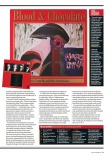 "Uncomplicated" is the perfect introduction to Blood & Chocolate, an album of vandal rock 'n' roll, primal mono-rhythms, blunt-force attacks and words that take a masochistic delight in aggravating exposed emotional nerve-endings. Compared to the airy Hollywood professionalism of the King Of America sessions, Blood & Chocolate has the mood of a dysfunctional family summit in the back room of a West London bookie's, the atmosphere thick with unpleasant home truths and festering resentments.
On the surface, the return of The Attractions and Nick Lowe, producing for the first time since Get Happy!!, seemed to signal a retreat to first principles. The rich, chiming carnival pop of "I Hope You're Happy Now," "Blue Chair," "Crimes Of Paris" and "Next Time 'Round" is certainly a continuation of a theme begun on This Year's Model and evolved through the likes of "Accidents Will Happen," "Temptation" and "Man Out Of Time." But, in general, this is a darker take on Costello's bedrock sound. Blood & Chocolate revisits the template of his classic early albums with almost 10 years' worth of musical experience and interpersonal resentment in the bank, and the results border on the murderous.
Convening between March and May at Olympic Studios, Costello used the tensions between his morale-drained band and their singer to stoke the performances. "He created situations where you basically just wanted to strangle the bastard," bassist Bruce Thomas recalled. "I suppose it was an artistic device."
The four musicians set up as they would at a concert, playing loud and live through a stage PA, with no screens for separation. Microphones were dotted around the huge studio, an anti-technique that often renders The Attractions as blunt and brutal as a club. Each song was done in two or three takes and overdubs were minimal. Costello's girlfriend, Pogues bassist Cait O'Riordan, contributes vocals here and there, Lowe adds a touch of Akoustika Guitaro (all the sleeve credits are, naturally, written in Esperanto), but precious little air is allowed into the room. The textures of the title are apt. This is thick, dark, sticky stuff.
Musically, Blood & Chocolate possesses all the ugly drama of a final reckoning. Lyrically, it's pained and personal, albeit shot through with pitch-black humour. A remarkable number of songs concern three-way love affairs, some of which end more happily than others. "Honey, Are You Straight Or Are You Blind?" is a brief, fractured snapshot of a ménage à trois in which a female interloper is turning his girlfriend's head: "She's coming in between us, you know that she is," Costello sings with a raised eyebrow. In the cantering "Next Time 'Round," "she's in the bedroom with that boy of hers" while Costello is stranded on the landing and seems, frankly, out of his depth.
"I Hope You're Happy Now," on the other hand, is played largely for laughs. Costello takes a swipe at an ex and her hapless new beau, portrayed as the fall guy from some ludicrous '70s sitcom, with "his turquoise pyjamas and motorcycle hat." "Blue Chair" examines a similarly triangular affair with a little more heart and poetic obfuscation, buttonholing a love rival who might have won the battle but, it seems, is going to lose the war.
Yet when Costello's defences finally crumble, they do so on an epic scale. "Home Is Anywhere You Hang Your Head" feels so spectacularly sorry for itself from its opening line — "Here comes Mr Misery" — it could have been written while staring hungover into the mirror. Its gloomy preoccupation with love soured is a mere palate-cleanser, however, for the full-blown horrors of "I Want You," in which Costello's infamous revenge-and-guilt ethos is taken to sado-masochistic, possibly psychopathic extremes.
Over almost seven minutes he's ensnared by blurred visions of the object of his obsession and another man. He is by turns chilling, vulnerable, pleading, pathetic, stalkerish: "I'm afraid I won't know where to stop." Around these slow-burning obsessions, The Attractions roll out a heavy, concentric groove, descending deeper and deeper into the morass, stopping off only for Costello to deliver a truly deranged two-note guitar solo. For the final 60 seconds the band are leaking through the singer's microphone, a ghostly counterpoint to his whispered confessions.
If "I Want You" documents a troubling personal apocalypse, "Tokyo Storm Warning" is a global one. Dylan's "Subterranean Homesick Blues" rebooted for the fresh hell of Thatcherism, it's a six-minute pan-global nightmare vision of a world run to ruin. Over a loose Bo Diddley beat and The Attractions' churning block of noise, Costello sweeps from the "monster movie scenery" of Japan to an Alabaman Ku Klux Klan convention, the Heysel stadium disaster, the Folies Bergère and the "Costa Del Malvinas."
Like several of these songs, it's essentially a turbo-charged blues, the reliance on repetitive rhythm and minimal chord changes suggesting that Costello wants nothing fancy coming between him and his intimations of disaster. "Poor Napoleon," too, is spare and sulphurous, and its preoccupations darkly familiar. Halfway through this hesitant, bass-heavy tale of sex and murder, Costello asks a question that seems to sum up the mood of the record: "Did you ever think there's far too many people in the world?"
Ten years into his recording career, Blood & Chocolate was a rather glorious exercise in creative tunnel vision. It's also a smudgy full stop, marking the end of his deal with Columbia Records, the end of the road with The Attractions and the last hurrah for a certain kind of scorched sensibility and sound. It's a record that does one thing tremendously well. On the next, he would try to do everything all at once.
|
|
Mighty Like A Rose
Graeme Thomson
The bold beginning of Costello's next phase or a dense and impenetrable wrong move? It's complicated....
|
The long hair and the Catweazle beard seemed to instantly alienate critics and fans alike when Elvis Costello returned with his 13th studio album. But the changes that dictated the shape and sound of one of his most dense, complex and relatively unloved albums were far more radical. Between the recording of Spike and Mighty Like A Rose, Costello had relocated to Dublin with Cait O'Riordan, a move partly predicated on his disgust at the Anglo-American political axis after 10 years of Tory rule and the beginnings of trouble in the Gulf. His rage would seep, none too coherently, into new songs such as "Invasion Hit Parade" and "Hurry Down Doomsday."
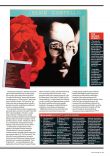 Costello was also enjoying an intense immersion in classical music. He had become an avid follower of pioneering string ensemble The Brodsky Quartet, and could also be heard raving about the varied charms of Schubert's sonatas, Schoenberg's Gurrelieder and Cecilia Bartoli. This new interest began to shape the way he approached his own music and the ambitions he harboured for it. When he was commissioned in 1990 to score, with Richard Harvey, the soundtrack to Alan Bleasdale's television drama GBH, Costello found himself striving to communicate more sophisticated melodic and harmonic ideas without being able to read or write music. With the help of a computer, he began composing multiple, overlapping melodic lines, a methodology he used not only for GBH's instrumental pieces, but also for arranging songs for his next album.
If Spike was marked by a Tom Waitsian sonic adventurousness, Mighty Like A Rose was an even bolder step. The original plan had been to make an album rooted in live performances with The Attractions, but their participation foundered on financial disagreements (although both Steve Nieve and Pete Thomas appear on the record). Instead, Costello turned to the group of crack US sessions musicians he'd been working with, on and off, live and in the studio, since King Of America.
In the end, the idea of a tight pop record got lost beneath the kitchen-sink production style. Opening track and lead single "The Other Side Of Summer," an enjoyably manic surf-pop gem propelled by Costello at his most quotable ("Was it a millionaire who said 'Imagine no possessions'?" snarls Paul McCartney's latest writing partner), featured 10 musicians playing live simultaneously. Their parts were then double-tracked, before three separate vocal harmonies were added to the main melody.
This ornate extravagance, typical of the album, was not random. All the vocal lines were carefully planned, the string and horn parts had been written on keyboard beforehand, and even the sequencing had been predetermined before a note had been recorded. Mighty Like A Rose was intended as a canvas for Costello to display more ambitious ways of writing and arranging, but the problematic result is that the more inviting songs — and there are several excellent ones here — arrive swamped by layers of stuff.
Some of them are as dense and impenetrable as anything Costello has ever recorded. "Invasion Hit Parade," a huffing stop-start affair featuring a trumpet cameo from his father Ross, tackles the Cold War thaw so obliquely that its true purpose remains inaccessible. Co-producer Mitchell Froom later recalled a 25-minute conversation with Costello on the meaning of the song, at the end of which he wasn't any more enlightened. "Hurry Down Doomsday" takes aim at the Gulf War and cultural imperialism — "Mickey Mouse, Marlboro and Coca-Cola" — but lands closer to incoherent ravings.
The idea of marrying rich, baroque orchestral pop to a bleak worldview was an interesting one on paper, but it often fails in execution. "Georgie And Her Rival" opens with the same chord sequence as "Oliver's Army," but its pop nous is buried in clutter. "All Grown Up" is a lovely song, but one hamstrung by Costello's decision to roar the words like an embittered drunk at a shotgun wedding.
Even when all the busy-ness is stripped away, the results fail to convince. The stark "After The Fall" is drab and lifeless. "Broken," a Celtic dirge written by O'Riordan and recorded against a backdrop of ethereal aural wallpaper, remains a blot on Costello's catalogue. One of two McCartney co-writes, "Playboy To A Man" is a careening trifle, though its raw energy perhaps comes closest to the record's intent.
At other times, the plan almost comes together. The elegant chamber setting of "Harpies Bizarre" conveys a mannered restraint utterly in keeping with the song's put-upon female subject. On "So Like Candy," the other McCartney collaboration, the minor-chord murk and Valium haze renders the sad mustiness of a vacated room palpable. "How To Be Dumb" — a coruscating riposte to the publication of Bruce Thomas' memoir The Big Wheel, in which Costello, and indeed life itself, does not emerge with much credit — turns personal enmity into a rousing reprise of "Like A Rolling Stone." Best of all is "Couldn't Call It Unexpected No 4," a dark fireside tale of family secrets, lost faith and lingering regret on which the album's ambition at last pays tangible dividends, the gorgeous melody lifted by an ambitious, carnivalesque arrangement.
Mighty Like A Rose is not a record that often succeeds on its own terms, but it was one Costello clearly needed to make. With the benefit of hindsight it makes more sense, setting him on the path he would follow for much of the 1990s and beyond. His collaborations with the Brodsky Quartet, Anne Sofie von Otter and Burt Bacharach, his curation of the 1995 Meltdown festival, his move into scoring opera and ballet, can all be traced back to this point. For good or ill, the roots of Costello as all-round musical renaissance man are planted here.
|
|
Brutal Youth
Jon Dale
The Attractions accidentally reform, as EC returns to the rough stuff. "His almost universal excellence is starting to disturb me!"
|
After the elaborations of 1991's Mighty Like A Rose and 1993's collaboration with The Brodsky Quartet, The Juliet Letters, it felt a little like Costello was painting himself into a corner. An ornate one, where the songs were still enduring and compelling — The Juliet Letters in particular — but a corner nonetheless. One of the great myths of the record-release-tour cycle, though, is that of logical chronology, that x follows y follows z. In Costello's world, things tend to be a little less clear-cut.
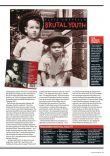 So, in the same year as The Juliet Letters, the dedicated Costello fan would have found themselves shelling out coin for the debut solo album by ex-Transvision Vamp lead singer Wendy James, Now Ain't The Time For Your Tears. Costello had been approached to contribute a song to James' debut solo album, and countered with an offer to write the whole thing — a typically all-or-nothing gesture. Costello sent James 10 songs, some co-written with his wife Cait O'Riordan, on a tape where he'd blasted out rough versions with Pete Thomas on drums. Thomas carried over to the album, but what resulted was a bit of a curate's egg: the finished product, airbrushed and glossed, doesn't necessarily play to the immediate strengths of Costello's songs, but neither is it the debacle many claim — songs like "London's Brilliant" have a sweet snarkiness to them that James carries off with aplomb.
Costello and Thomas had also been working on a project called Idiophone, with roughs recorded back in Pathway Studios. (Costello's musical, which he was working on at the same time, is yet to see the light.) This project then mutated, slowly but surely, into Brutal Youth, an album that brought back together, for the first time since 1986, The Attractions, with Nieve first joining the fold, while bass duties were filled out by Nick Lowe and then Bruce Thomas; producer Mitchell Froom had been working with the ex-Attraction on Suzanne Vega's elliptical folk-rock masterpiece 99.9F°. And if you're wondering why Lowe only appears on some of the songs, Costello's liner notes for Brutal Youth explain: "Nick, who has always remained understated about his instrumental abilities, claimed that [the ballads] simply contained 'too many Norwegians' for his style of playing. In other words: too many damn chords."
It may have come about by a series of connections and fortuitous circumstances, but once you hear the songs on Brutal Youth, it's hard to believe Costello wasn't writing with The Attractions in mind. Perhaps that was going on at a subconscious level, a return to the old gang after the different terrain he'd been traversing in recent years. Perhaps, too, there was something in Costello being around the corner from turning 40, and making peace with former selves. He wasn't above mocking his achievements as a genre-leaping, master-of-all-trades songwriter, either — "My Science Fiction Twin" features the quick-witted quips, "His almost universal excellence is starting to disturb me / They asked how in the world he does all these things / And he answered, 'Superbly'."
There's also a palpable sense of rejuvenation in the air throughout Brutal Youth, an occasional moment of collective scores settled, and a simple roughhousing joy in playing the guitar rather fucking loud with an exceptional band in tow. Just don't call it "back to basics" — there's rather more going on here than you think at first blush. Opening with three songs that flood the sensorium with visceral playing, clanging guitars, spittle, invective, observational rage, humour — "Pony St.," "Kinder Murder" and "13 Steps Lead Down" — The Attractions are playing with fire under their feet as Costello reels off a catalogue of brutalities and indiscretions. The ageing hipster mother of "Pony St." is upbraiding her daughter for being a square, while playing the fly-by-night radicalism of the '60s for its shallow core: "If you're going out tonight / I won't wait up / Reading Das Kapital / Watching Home Shopping Club."
Reflecting on the song while talking to Bill Flanagan, Costello confessed, "One of the things I got the story off was a review I read of Guns N' Roses in one of the English papers. The journalist asked this seven-year-old girl which one of Guns N' Roses she liked most and she said, 'I like Axl Rose 'cos my mummy says he puts a cucumber down his trousers.' And I thought, well, there it is — there's rock 'n' roll neutered forever." Some of Brutal Youth moves that moment of disappointment into other contexts, like the "fantasy afterlife" nightclub/ Don Juan nightmare of "This Is Hell," where "My Favourite Things" tortures the speakers — "It's by Julie Andrews / And not by John Coltrane." Or "13 Steps Lead Down," which pulls together a tale of visiting the tombs of Spanish kings, a pun on the 12-step programme, and a sinister bondage diorama.
"13 Steps Lead Down," the album's second single after "Sulky Girl," was furious and thrilling. But then, after the regal "This Is Hell," Costello goes back to his soul roots with "Clown Strike," "You Tripped At Every Step" and then later, "Rocking Horse Road." These aren't quite as successful, feeling like Costello is revisiting some of the terrain of Get Happy!!; but without the cohesive vision of that album, they're left feeling a little anomalous. Elsewhere, though, Costello leaps around with conviction and canniness: certainly, following up the melodramatic, melancholy poise of "Still Too Soon To Know," the arrangement naked and wilting, with the strained, warped rockabilly stroll of "20% Amnesia" is a confident move, proof of a group playing together near the peak of their powers.
If Brutal Youth suffers from anything, it's a slight dip in quality in its second half — there are still good songs filling the album's back end, but "Just About Glad" and "All The Rage" recast stronger moments from earlier in the record. Closing with the beautiful piano-and-voice shiver and sigh of "Favourite Hour" helps to pull the album together, though, its dark intensity a late-night reflection of the ferocity of those three opening salvos. And there, Brutal Youth's strangely circular logic reaches its destination, an album that reconnects Costello with his past and fires him off into a future uncertain, but with one of his more potent sets of songs in his back pocket. It's no real surprise that he would turn the corner and give us another set of covers — as if to say that, at least right now, he couldn't top Brutal Youth's brutal pleasures.
|
|
Kojak Variety
Garry Mulholland
Hidden charms! Mercifully rescued from the archives: a crate-digging covers set recorded on an all-star jaunt to Barbados.
|
A for a celebrated songwriter, Elvis Costello has recorded and performed an awful lot of covers. Kojak Variety might stand as only his second, and thus far final, album of cover versions, but by 1995 Costello had released over 40 interpretations of other songwriters' material, and the 2004 remastered edition of Kojak Variety came complete with a bonus CD comprising a further 20 previously unreleased covers recorded by Costello in the 1990s. These included such obvious classics as Lennon/McCartney's "You've Got To Hide Your Love Away," Chips Moman and Dan Penn's soul standard "The Dark End Of The Street" and Bruce Springsteen's "Brilliant Disguise," the latter two as part of a private demo for Costello's country hero, George Jones.
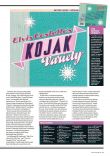 But, for the original Kojak Variety, Costello was in full crate-rummaging record collector mode; selecting 15 tunes dominated by obscure album tracks and B-sides from the 1950s and '60s, dominated by soul, rhythm 'n' blues and country, in which only two songs — British dance bandleader Ray Noble's "The Very Thought Of You" and Ray Davies' much-loved "Days" — were not written by Americans.
It's no surprise, then, that the small band chosen to back Costello on this reverent tribute to American roots is largely comprised of US session royalty. Guitarists James Burton and Marc Ribot, drummer Jim Keltner, keyboardist Larry Knechtel and bassist Jerry Scheff are the kind of legends who can include names such as Presley, Dylan, Lennon, Cash, Waits, The Beach Boys and The Doors on their CVs, although Costello also found room for his loyal Attractions sticksman Pete Thomas. What may come as more of a surprise is the almost-offhand nature of the album's genesis.
In 1990, Costello had planned to follow Spike with an album with The Attractions. But the negotiations became, according to Costello's own liner notes for Kojak Variety, "a theatre for delusions and long harboured grudges," and the Attractions reunion was shelved. Instead, Costello decided that a fortnight in the Caribbean with musicians he had worked with in touring band The Confederates and, in Ribot's case, the Spike sessions, would be a lot more fun than squabbling with old friends. Cue two weeks at Blue Wave Studios in Barbados, dodging mongooses and battling with Costello's untimely bout of laryngitis. The odd, Telly Savalas-referencing title came from a grocery store near the studio that Costello felt reflected the arcane, pick-'n'-mix nature of the Kojak Variety material.
Costello wanted label Warner Brothers to just throw the album out as a low-key release somewhere between 1991's Mighty Like A Rose and his 1993 Brodsky Quartet collaboration The Juliet Letters. But major labels don't cough up for trips to Barbados only to slip the resulting sessions out unnoticed. Consequently, Kojak Variety occupies a strange position in the Costello canon: a somewhat out-of-place intermission between Costello's final albums with The Attractions. This affected the confused critical response more than anything else, as fans delighted by Brutal Youth's return to the raging, feral beat-pop of Costello's early days were suddenly expected to get happy about a set that, in places, sounded like a rarefied version of a Jools Holland blues-jam on Later.
Therefore, the opening workmanlike brawl with the Screaming Jay Hawkins B-side "Strange" has you fearing the worst, as do Little Willie John's "Leave My Kitten Alone," a misguided Little Richard impression on "Bama Lama Bama Loo," a messy stomp through Jesse Winchester's "Payday" and gospel-jazz slouches through Willie Dixon's "Hidden Charms" and Mose Allison's "Everybody's Crying Mercy."
But the slower and more feminine the album becomes, the better it gets. The Supremes' "Remove This Doubt" is a gorgeous deep soul weepie, with Knechtel's romantic piano triplets and Costello's own falsetto harmonies keeping the girl-group drama high, despite the lyrics' change of gender. The same androgynous ballad tricks buoy Burt Bacharach's "Please Stay," Aretha's "Running Out Of Fools" and Randy Newman's "I've Been Wrong Before," previously recorded by both Dusty Springfield and Cilla Black.
And although Bill Anderson's "Must You Throw Dirt In My Face" and "The Very Thought Of You" are both male compositions, Costello sings and arranges them with big nods towards the torchy female soul ballads of the '60s, to delicious, sighing effect.
Kojak Variety's two finest moments, however, are exceptions to the in-touch-with-your-feminine-side rule. Costello's confident take on Bob Dylan's "I Threw It All Away" from Nashville Skyline sees him sing it like Lennon over a perfect meld of R'n'B feel and Pat Garrett...-era Dylan arrangement. It's a top-class Costello cover, but still not as thrilling as his spooky, freaked-out take on The Kinks' "Days," in which Costello rediscovers that thick, queasy, nasal voice that made his early records so savage and true (it also sounds oddly like 2014-era Damon Albarn). "Days," with its dislocated dub-psych deconstruction of Ray Davies' elegant nostalgia, is right up there among Costello's finest moments.
On the liner notes for the 2004 reissue, Costello reiterates his regret that Kojak Variety hadn't been allowed to "simply appear in the racks" sometime in 1991, remarking that the album would have "had more charm if issued in this fashion." But Kojak Variety's best moments are sublime, and the whole project echoes a key couplet from its second song: "When I hold you in my arms / It brings out all of your hidden charms."
|
|
Painted From Memory
Rob Hughes
|
Rob Hughes reviews Painted From Memory; Rob Hughes reviews Painted From Memory; Rob Hughes reviews Painted From Memory;
|
|
North
Nick Hasted
|
Nick Hasted reviews North; Nick Hasted reviews North; Nick Hasted reviews North; Nick Hasted reviews North; Nick Hasted reviews North; Nick Hasted reviews North; Nick Hasted reviews North; Nick Hasted reviews North;
|
|
The River In Reverse
John Lewis
|
John Lewis reviews The River In Reverse; John Lewis reviews The River In Reverse; John Lewis reviews The River In Reverse; John Lewis reviews The River In Reverse;
|
|
Momofuku
Terry Staunton
|
Terry Staunton reviews Momofuku; Terry Staunton reviews Momofuku; Terry Staunton reviews Momofuku; Terry Staunton reviews Momofuku; Terry Staunton reviews Momofuku;
|
|
Secret, Profane & Sugarcane
David Quantick
|
David Quantick reviews Secret, Profane & Sugarcane; David Quantick reviews Secret, Profane & Sugarcane; David Quantick reviews Secret, Profane & Sugarcane; David Quantick reviews Secret, Profane & Sugarcane;
|
|
|
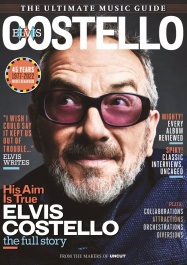
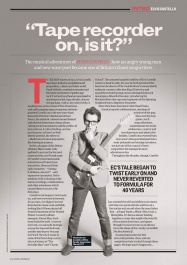
Cover and page scan.
Contents pages.
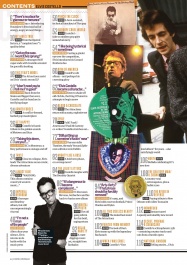 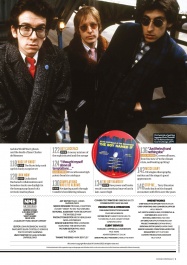
My Aim Is True
Peter Watts
Straight out of the lipstick factory, a "complete loser" comes good.
|
When My Aim Is True landed on the desk of American critic Greil Marcus, he "thought it was a hoax." In the rock world of 1977, nobody looked or sounded like the man on the cover, with bully-me glasses, gammy-legged stance, whiney voice and loud jacket. "I didn't believe anyone as geeky, who looked as if he were about to trip over his own feet, would have the nerve to appear in public under his own name," Marcus said when considering the 2001 reissue of My Aim Is True.
In a way, he was right. Costello was the creation of Declan MacManus, born in London in 1954. With a bandleader dad and a mum who ran a record store, MacManus was always going to take an interest in music, and by 1970 he was playing folk clubs before forming a pub rock band, Flip City. In 1975, MacManus had to take a desk job to support his wife and son, and rather than give up on a career in music, this seemed to ignite the single-mindedness that would illuminate his career.
"In 1976, I was operating an IBM 360 computer in a lipstick factory," he recalled. "My duties included printing out invoices for the moustache waxes of the occasional duchess who visited the company's West End salon." Costello commuted to Acton from Hounslow and the songs he wrote on the way were drenched in a potent solution of spiky bitterness, like Jimmy Porter with a six-string.
Renamed DP Costello — the surname, occasionally used by his father, came from a paternal great-grandmother — he tried his hand as a solo artist, touting demos to labels and getting played on radio. He visited record companies, performing auditions in front of bored executives, something that must have tortured a man of Costello's self-belief.
Redemption came in the shape of Nick Lowe, producer at Stiff Records. Lowe met Costello in 1972 in Liverpool when Lowe was playing in Brinsley Schwarz. In 1976, fortune struck again when Lowe bumped into Costello at Royal Oak station. Costello had just delivered his tape to the Stiff office. Stiff already knew of DP Costello, and Lowe's enthusiasm made it straightforward — £150, "a new cassette tape recorder and a Vox battery-powered practice amp."
Stiff had their man and their man had his songs, but nobody seemed quite sure what to do next. Should he write songs for Dave Edmunds' new band, Rockpile? Should he record a split LP with Wreckless Eric? Enthused by neither option, Costello was sent into a tiny studio in Holloway to knock up a single. Now cannily rechristened Elvis by manager Jake Riviera, he was backed by Clover, a group of Americans who had accidently become Stiff's house band and would later become Huey Lewis And The News (Lewis was absent from the Costello sessions). With Lowe swathed in cigarette smoke behind the board, My Aim Is True came together in six four-hour sessions.
Costello said he was motivated by "revenge and guilt," and My Aim Is True is all about sexual frustration, restrained violence and impotent fury. Opening track "Welcome To The Working Week" raises the flag, slamming a woman who can't acknowledge the narrowness of her existence. "Sometimes I wonder if we're livin' in the same land," Costello spits. "If they knew how I felt they'd bury me alive." Costello would batter home the point in interview: "There's nothing glamorous or romantic about the world at the moment."
Musically, My Aim Is True is suburban R'n'B, filtered through Clover's professionalism and Stiff's haphazard ethic. It's the latter that gives the album its punkish urgency — "I didn't even know if the record was going to come out, Stiff only existed from week to week," Costello said. Costello's domestic responsibility meant he was removed from the punk movement and few punks would have recorded anything like the countrified "Miracle Man" or the Platters-like "No Dancing," the second and third songs on the album, let alone the Edward Lear rockabilly "Mystery Dance" of Side Two. Dominating the music is the man, or a shadow of one. Throughout My Aim Is True, Costello has rings run round him by superior women, in one case listening at the door while a former girlfriend entertains another lover. "Those are the only songs in a rock idiom where a man is admitting absolute defeat," he said. "I'm talking about being a complete loser."
Also recurring is the Catholic imagery — it's there in "Miracle Man" and "I'm Not Angry," and also fourth track "Blame It On Cain," a sleazy rocker that is followed by the subtle, stalkerish menace of "Alison," another ditty addressed to an ex. "Alison" provides a change of pace, which demonstrates the depth of Costello's talent and also allows guitarist John McFee a moment to shine. The song would soon be covered by Linda Ronstadt, while Costello would confess he based the chorus on "Ghetto Child" by The Detroit Spinners. Costello wrote most of My Aim Is True at work or on the tube, but "Alison" was written at home at night. Scared of waking his family, Costello sang so quietly he "didn't really know what it sounded like until I got into the studio."
"Sneaky Feelings" ends Side One on an optimistic note, before the Byrds-like "(The Angels Wanna Wear My) Red Shoes" offers the classic couplet "I said, I'm so happy I could die / She said 'drop dead' then left with another guy." It's great fun, but just when it seems Costello is all about self-obsessed sneering, "Less Than Zero" provides a vicious reggae-touched fantasy slapdown of British fascist Oswald Mosley. It's the first of Costello's political songs, and although he would become subtler and angrier, he already shows a knack for getting to the point without banging the listener over the head. Costello would rewrite the song for America, switching Oswalds from Mosley to Lee Harvey.
Costello's fondness for Randy Newman comes out on the piano roll whimsy of "Pay It Back," before the rocky "I'm Not Angry" offers a summary of themes so far, from the opening line — "You're upstairs with the boyfriend while I'm left here to listen" — through the Catholic imagery, the autobiographical references and the ambiguous sense of poisonous capitulation to a former squeeze. The album ends with Dylanesque ramble "Waiting For The End Of The World," although the American edition included Clash-influenced pop-dub single "Watching The Detectives." Strong reviews pushed My Aim Is True into the charts, allowing Costello to give up his job and recruit a permanent backing band. Not bad for a loser. The geek had landed.
|
|
Armed Forces
David Quantick
This time it's war! A salute to the album originally known as Emotional Fascism, a barbed pop masterpiece.
|
When an artist and the people around the artist are peaking — when their commercial and critical success is matched by their own confidence and ability to realise what they want to do — elements often seem to fall into place. So, for example, almost every song on Armed Forces seems to fit the main theme of human relationships as tiny wars, militarism as simile for love, and the whole linking up of love, war and fascism.
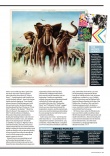 So, for example, it's a piece of sequencing wit that causes the first words sung on the record to be "Oh, I just don't know where to begin" and the last to be "I will return / I will not burn." So, for example, it's a record that sounds as 1979 and new wave as, say, The Boomtown Rats' Tonic For The Troops or the Stadium Dogs' What's Next or Squeeze's Cool For Cats, but it's also a record that's confident enough to take on every pop music landmark from ABBA to Abbey Road, but on its own terms. Armed Forces is an album that could only have been released in 1979, but — like Blonde On Blonde, like Exile On Main Street, like Innervisions — it's also an album that's of its time and stands outside its time. And it contains one of the greatest singles ever made. And it's a concept album.
Concept albums were apparently one of the many sworn enemies of punk rock, but they were never far away — Sham 69's That's Life, The Jam's Setting Sons and The Stranglers' Meninblack being prime examples. The best example, of course, the most coherent and brilliant concept album released during the punk and new wave era, was Armed Forces. With superb artwork (Barney Bubbles working with aptly named French collective Bazooka) reflecting the contents of the record, Armed Forces' secondary, and original working, title of Emotional Fascism made this a perfectly themed collection of songs; one that the likes of Pink Floyd would never have been able to put together so coherently and so powerfully.
"Goon Squad." "Green Shirt." "Oliver's Army." "Two Little Hitlers." "Senior Service." Lyrics about power and betrayal and soldiers and "corporals into corporal punishment" and "the final solution." The jerky goosestep beat of the new wave and the singer's obsession with control and revenge channelled into the bleakly honest world of emotion as fascism (and what emotion — engineer Roger Bechirian recalled Costello singing with such force that the "moisture" in his voice caused the microphones to repeatedly short out).
Armed Forces is the first album where Costello and his producer Nick Lowe — the greatest pop pasticheur since Paul McCartney — realised that they could have their pop music cake and eat it, satirising and pastiching the entire history of the hit parade for fun and profit (other Costello albums take on entire genres and win, but never with the sheer glee and bile of Armed Forces, which dropped on the chart scene of 1979 like an atom bomb disguised as a K-Tel party album). Armed Forces has all the piss and vinegar and spleen of its predecessor, This Year's Model, but disguised as fizzy pop and cartoons.
The songs — full of references to Roy Orbison ("Busy Bodies"), ABBA ("Oliver's Army"), The Beatles ("Party Girl"), David Bowie ("Green Shirt") and Ian Dury ("Sunday's Best"; well, written for him, anyway) and many others — are produced with a verve unlike any other. Apart from the much-discussed "Dancing Queen" piano played by Steve Nieve on "Oliver's Army" — a song inspired, said Costello, by a visit to Northern Ireland — there's the insane double-tracked singing on "Goon Squad," where a faraway Costello keeps pace with his own lead vocals, the absurd looping bassline played by Bruce Thomas on "Party Girl" in tribute to The Beatles' "I Want You (She's So Heavy)," the sequencer on "Green Shirt" (with its reference to Madison, Wisconsin's bizarrely named medical facility, the Quisling Clinic). And over it all there's Elvis Costello's voice, at its sibilant, jerky ("I am starting to func-tion / In the us-ual / Way," he sings on "Big Boys" like a robot Steve Harley), mucoid, furious best. Charles Shaar Murray once noted Costello's ability to soften his voice for the radio as well as belt out the bile, and you hear that facility all over Armed Forces when he moulds his vocals to fit the songs as they range from poppy to angry to cynical.
Armed Forces is an astonishing record, well rounded (astonishingly so, for an album written in hotel rooms and on tour buses) but also immediate (most songs were apparently nailed on the first take), commercial, intelligent and furious. But it was the end of something, not the beginning. Costello was apparently already concerned about repeating himself stylistically (B-sides and new songs recorded at this time, like "Wednesday Week" and "Talking In The Dark," suggest that he was now drawing on himself for inspiration). America, and the mainstream, were not so much beckoning as demanding he come and get in a hot tub full of cocaine and money with them.
And in 1979, two events — one trivial, the other much less so — occurred that were to change Elvis Costello's career forever. Last, and leastly, "Back Of My Hand," a single by a new wave band from Yorkshire called The Jags, entered the charts at No 17. It was a record seemingly composed of offcuts from Elvis Costello records. And, of greater significance, on March 15, 1979, Costello and The Attractions met the Stephen Stills Band and Bonnie Bramlett in the bar of the Holiday Inn, Columbus, Ohio, and had a drunken argument which, for better or worse, took Elvis Costello's potential career as the British Tom Petty away.
We'll never know what the FM skinny-tie new wave Elvis Costello would have been like if he had stayed with the pop money and made Armed Forces 2. Almost certainly, the career moves he did make were for the best. But we still have this, one of the most extraordinary, smart and original pop albums ever made.
|
|
Almost Blue
Rob Hughes
"WARNING: This album contains country & western music and may cause offence to narrow-minded listeners."
|
If Elvis Costello had been toying with the idea of retiring from music prior to Trust, its disappointing sales numbers hardly lightened the mood. His marriage was failing, he was drinking too much, and the collective tension within The Attractions showed little sign of easing up.
As a consequence, he chose to take a break from songwriting altogether — though crucially, not from the studio itself. Costello had come to the conclusion that he could better articulate his current state through other people's songs. And what better medium to express his sorry disillusionment than country music?
This was no arbitrary solution to a dilemma. Costello had been a country disciple for most of his life. Hank Williams was part of the repertoire during his folk club days as Declan MacManus, and during the Live Stiffs jaunt of '77, it was suggested that he remove The Best Of George Jones from the tour bus for fear of "confusing" guests from the music press. The same rationale, you suspect, was behind the label's decision to nix the Jones-apeing "Stranger In The House" from My Aim Is True. Costello had eventually realised an ambition, though, when he and Gorgeous George cut a duet of the song for the latter's My Very Special Guests in 1979.
Seduced by the self-destructive tropes of classic country, Costello opted to go the full mile on his next album. He and The Attractions flew to Nashville and hired Billy Sherrill, famous for his work with Jones, Tammy Wynette and Charlie Rich, as producer. Also in tow was a camera crew from The South Bank Show, their interest piqued by the sight of one of Britain's edgier talents making a detour into the distinctly unhip realm of country.
The band were joined by fiddler Tommy Millar and lead guitarist/pedal steel player John McFee at CBS' Studio A, where Costello had shortlisted a bunch of songs previously recorded by the likes of Hank Williams, Patsy Cline, George Jones and Gram Parsons. The latter was a key signpost on what became Almost Blue. Costello's initial interest in country had been sparked by the discovery of two Parsons-heavy albums as a teenager: The Byrds' Sweetheart Of The Rodeo and The Flying Burrito Brothers' The Gilded Palace Of Sin. Both records ached with a peculiar sense of longing, made all the more potent by a soulful voice that seemed to foretell some hopelessly broken future.
Given that Parsons died young, at just 26, the sentiment of these songs now drew Costello in deeper. Two Gram covers made it onto Almost Blue. The first, "I'm Your Toy" (aka "Hot Burrito #1"), found Elvis in potent form, crying hurt while his onetime lover sinks into the arms of another. It's a midtempo ballad that more or less sticks to the arrangement of the original, as does the second Parsons co-write, "How Much I Lied," marked by Steve Nieve's rolling piano riff.
Such faithful adherence to source material was a constant puzzle to Sherrill. This clearly wasn't what he was expecting. And while Elvis fans no doubt had similar concerns about the choice of producer (as a pioneer of Nashville's countrypolitan sound, Sherrill was noted for sugaring his work with liberal use of strings), Costello knew what he was aiming for. If the choice of song was right, he argued, there could be a genuine tension between the emotion of the singer and Sherrill's smooth backdrops.
Yet Sherrill couldn't understand why an English ex-punk would want to cut an album of "worn-out" country covers. His barely disguised indifference to the whole thing caused a degree of tension in its own right. Only when Costello and the band ripped through an utterly irreverent version of Hank Williams' "Why Don't You Love Me (Like You Used To Do)?" did the producer get animated at all, double tracking the song for added oomph. Most of the time, though, as Costello recalled later, "it was less of a collaboration and more of a contest in cultural differences." He added: "Anybody who has seen The South Bank Show will know Mr Sherrill as an impatient man with an overwhelming interest in speedboats."
Still, over the course of 12 days in Nashville, the band recorded over 25 covers, of which a dozen made it onto the album. It was only fitting that, given Costello's predilection for booze, a pair of drinking songs made the final cut. One of them is an uptempo take on Merle Haggard's "Tonight The Bottle Let Me Down," imbuing the song with a fine dash of R'n'B swing. The other is Charlie Rich's gin-soaked "Sittin' And Thinkin'," which proved a capable vehicle for both Sherrill's backing choir, Nashville Edition, and the weepy drift of McFee's pedal steel.
As if to pre-empt a tough reception, at a time when populist country in the UK meant little more than Kenny Rogers and Crystal Gayle, Almost Blue's cover came with a sardonic sticker: "WARNING: This album contains country & western music and may cause offence to narrow-minded listeners." It fared better than Costello may have expected, however, outselling Trust and landing him a first Top 10 hit for 18 months with "A Good Year For The Roses." Written by Jerry Chesnut and originally cut by George Jones, it's a classic break-up ballad that Costello tackles admirably.
Almost Blue certainly isn't perfect, but neither is it the ill-judged genre exercise that some critics, especially in the US, tried to make out. Some reviews were scathing. The Washington Post declared it "a mean-spirited mess," while Creem dismissed Costello as little more than a "hack lounge singer." Elvis countered by suggesting that Americans resented him for daring to play their music.
At the surface, Almost Blue is simply a case of one man tipping the wink to the songs and artists who moved him. But the album also served to resolve something of a crisis of faith in his own songwriting ability, allowing Costello to clear the ground for his next endeavour, the wholly different Imperial Bedroom.
|
|
Punch The Clock
Peter Watts
A technical knockout of '80s pop. And, behind the horn section, lurk two political classics.
|
You can probably get a handle on Elvis Costello's feelings for Punch The Clock by the fact that, when asked to write sleevenotes for a 2003 re-release, he claimed to be "unable to recall a single further entertaining incident that occurred during these sessions," so simply reprinted the essay that prefaced the 1995 reissue, complete with typing errors. Punch The Clock is an awkward entry in Costello's catalogue. Boasting an atmosphere of superficial jollity, but also two of his finest, most deeply felt, political songs, it's an album that has to be considered a success on its own terms. It's the nature of those terms that left the strange taste in his mouth.
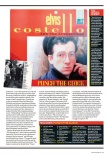 In 1983, Costello needed a hit, to get "reacquainted with the wonderful world of pop music." As he admitted, "If you allow contact with the mainstream audience to be severed for too long, you lose the freedom to do what you want to do." America hadn't shown much interest in Almost Blue or Imperial Bedroom, and the UK Top 30 hadn't been troubled since "Good Year For The Roses," so Punch The Clock has purpose and begins with gusto. "Let Them All Talk" and "Everyday I Write The Book" are frantic, full and ridiculously charming: the former is packed with crusading, peppy horns, the latter led off by a modern approximation of Motown backing harmonies. Slick, synthetic but by no means unpalatable, this was Costello embracing what he called the "passionless fads of that charmless time: the early '80s."
To his credit, it was a challenge Costello took seriously. First, he recruited the best pop producers in the land, Clive Langer and Alan Winstanley, who had married commercial success with artistic credibility on a succession of great singles with Madness, Teardrop Explodes and Dexys Midnight Runners and who brought with them the TKO Horns section. Costello wrote songs with the horns in mind, and when Langer asked him to stop his bedroom moping and write something with zest, Costello obliged, picking up the guitar for a sequence of songs about love and marriage. The first of these was "Let Them All Talk," which begins the album with a bounce that requires Costello produce a superb vocal performance to keep up, delivering a wry lyric that comments on "the sad songs that the radio plays."
It's followed by "Everyday I Write The Book," conceived by Costello as a Merseybeat spoof but successfully redrafted in the studio with a Motown feel. Backing vocals came from Claudia Fontaine and Caron Wheeler, known as Afrodiziak (Wheeler later sang Soul II Soul's "Back To Life"). The song exemplified the Langer/Winstanley process, patiently rebuilding a song track by track, using little of the original and demanding numerous retakes. It was a laborious process that didn't sit naturally with the spontaneity of The Attractions, but when it worked, the results were splendid. The excellent "Everyday I Write The Book" was, confessed Costello, "one of our very few entirely cheerful recordings." It reached No 33 in America, his first US hit.
Two songs in, and while Costello had made his point, he'd also set a pace impossible to maintain. The throwaway "The Greatest Thing," written to Langer's orders, is a "proud and wishful song on love and marriage" in which Costello rarely sounds as if he means what he's singing. It's followed by the woozy whimsy of "The Element Within Her" and "Love Went Mad," the latter an insubstantial hotchpotch that conceals a couple of arch lines ("a self made mug is hard to break") amid careering inanity.
Just when a trend seems to be established — undercooked songs meets overbaked production — Punch The Clock hits you with not just the best song on the album, but one of the best songs Costello has written. "Shipbuilding" started with a piano melody written by Clive Langer. Asked to supply lyrics, Costello went on tour in Australia, where he followed the Falklands war between Argentina and Britain through the tabloids, and produced a stunning, sad but above all wise meditation about war, industry, economy and class. Released as a single with Robert Wyatt supplying elegiac vocals, "Shipbuilding" had been a minor hit in April 1983, but Costello always planned to do his own version and, to distinguish it from Wyatt's version, called in Chet Baker to contribute mournful trumpet. Wynton Marsalis and Miles Davis were also considered, but Baker's solo is magnificent, even if he was "pretty spaced out" according to Langer, who pieced it together from three takes.
Side two kicks leads off with the horn-happy "TKO (Boxing Day)," with Costello ungallantly noting that "Now you don't look so glamorous, whenever I feel so amorous" and offering a bewildering litany of puns: "They put the numb into number, put the cut into cutie/ They put the slum into slumber and the boot into beauty." The tempo is sustained on the light funk "Charm School," with Afrodiziak contributing some of their best backing vocals, before "The Invisible Man," pulled together from discarded lyrics, struts into view like a Kinks outtake. The sequence of "Mouth Almighty" and "King Of Thieves" offer a low point, the former a half-hearted pop ballad, the second sprawling and shapeless. Given that the equally modest Squeeze-lite "The World And His Wife" is yet to come, the only thing saving the second half of the record from complete mediocrity is a song that, like "Shipbuilding," Costello didn't even write for the album. "Pills And Soap" was based on Grandmaster Flash's "The Message," with Costello delivering a tremendously cynical lyric, ostensibly about the iniquity of the tabloid press but also about political deceit and establishment hypocrisy, over a drum machine and Steve Nieve's dramatic piano. Stark and demanding, it came out before the general election of May 1983, with Costello styling himself The Imposter. He planned to bring it out on red vinyl in the event of Labour victory but, denied that satisfaction, instead covered The Beat's anti-Thatcher "Stand Down Margaret" on the BBC. Shortly after, Punch The Clock was released to a receptive public. Costello's calculated gamble had paid off, but it was a tightrope act he'd struggle to repeat.
|
|
King Of America
Andrew Mueller
Introducing The Costello Show, The Little Hands Of Concrete, and an illustrious new supporting cast... Declan MacManus' crowning glory?
|
We've become accustomed, 37 years into his career, to Elvis Costello's unpredictable waxes and wanes. However, around the time of the release of his 10th album, King Of America, there was considerable muttering to the effect that Costello was no sure long-term proposition. He had gone up like a rocket, this argument went, releasing five nigh-flawless albums in as many years straight off the launchpad, and had since been wafting slowly back down through less rarefied stratospheres, via a country covers project, a somewhat overheated orchestral pop opus, a Philly soul digression and, most latterly, the muddled, portentously titled Goodbye Cruel World. When he broke what was, by his standards, an epochal silence of two years with a hoarse, desperate swipe at The Animals' "Don't Let Me Be Misunderstood," many assumed that Elvis had, to all intents and purposes, left the building.
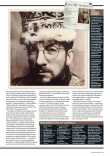 The outward appearance of King Of America offered little reassurance. The LP was formally credited, somewhat bafflingly, to The Costello Show (one of few places his familiar pseudonym appeared at all, with songs credited to Costello's real name, Declan MacManus, and guitars to The Little Hands Of Concrete, owing to a predilection for in-studio string-breaking). The cover was a sepia headshot of Costello sporting a beard, brocaded jacket, crown, and expression of bored insouciance, of the sort that might well preface inquiring, of some simpering serf, "And what is it that you do?" The sleevenotes prompted further bewilderment. It was surprising enough that The Attractions appeared on only one track, rather more so that for much of the album Costello was backed by men who had, until a decade previously, been playing for another Elvis: the TCB Band themselves, James Burton, Jerry Scheff and Ron Tutt. Also aboard were supreme jazz bassist (and once Mr Ella Fitzgerald) Ray Brown, former Little Richard (and almost everybody else) drummer Earl Palmer, and such top-drawer sessioneers as T-Bone Wolk, Mitchell Froom and Jim Keltner. If Costello had submitted to hubris, he hadn't done it by halves.
In his disarmingly candid essay accompanying the 1995 Demon reissue, Costello explained himself. "Don't Let Me Be Misunderstood" had been Columbia's choice of single, rather than his. The sidelining of The Attractions had been semi-accidental. An original plan to have them play on half the album had been overtaken by the fact that by the time they arrived in LA, sessions had gone so swimmingly that more than half was already done — leaving, as Costello recalled, "my sullen and estranged band hanging around our hotel harbouring a grudge or honing an embittered anecdote" (a good few of the latter, barely fictionalised, would surface a few years later in Bruce Thomas' score-settling memoir, The Big Wheel). It was hopefully some consolation that the one song The Attractions did play on, "Suit Of Lights," was very arguably the best thing on what was clearly, once you got around to playing the damn thing, one of Costello's very finest records.
Costello, steeped in a learned love of Americana, was always going to make a country record — his own country record, that is (Almost Blue, the respectful covers album recorded in Nashville with Billy Sherrill a few years earlier, felt in retrospect like EC's establishment of his credentials in this department). But throughout King Of America, Costello is both too smart and too confident to adapt himself to country tropes — that way, he knows, lies fatuous imposture, empty pastiche and the rarely edifying spectacle of Englishmen wearing cowboy boots. Instead, he adapts country to Elvis Costello — and country responds enthusiastically, as a genre always sympathetic to unusual voices and cunning lyricism would. Any doubts that he'd struck the right note were vanquished within the year when a reading of the rueful hangover romp "The Big Light" appeared as the opening track on Johnny Cash's Johnny Cash Is Coming To Town (other King Of America tracks to have been adopted by American country singers include Laura Cantrell's "Indoor Fireworks" and Rhett Miller's "Brilliant Mistake," and while it remains an outrage that George Jones never recorded "Our Little Angel," Rosanne Cash did).
Crucially, for all that he is recording in some of America's best-known studios with some of America's best-regarded musicians, Costello never loses sight of the fact that he's a stranger here — the opening lines of opening track "Brilliant Mistake" sound, in context, like a caution against succumbing to these kind of assumptions ("He thought he was the king of America / Where they pour Coca-Cola just like vintage wine"). On the heavily Cash-influenced "Glitter Gulch," he's the aghast, seduced hotel-room-flickerer between gaudy game shows on US television, underpinned by a James Burton masterclass on guitar and dobro. On the gentle waltz "American Without Tears" — a true story, by Costello's account — he sees something of himself in two elderly English GI brides drinking in a hotel bar, who don't quite belong here but can never really go home (a sequel, "American Without Tears No. 2," can be found on the Out Of Our Idiot compilation).
For all its explicit rooting in foreign soil, King Of America peaks at the points at which Costello is at his most personal — and therefore his most universal. "I'll Wear It Proudly" and its companion piece "Jack Of All Parades" are two of his most poised love songs, the former a beautiful devotional leavened with grateful humility ("In shameless moments / You made more of me than just a mess"), the latter an acknowledgement of the terror of losing something you never expected to have ("When we first met I didn't know what to do / My old love lines were all worn out on you"). The presumable subject of this pair, former Pogues bass player and soon-to-be Mrs Costello Cait O'Riordan, is also credited with co-writing the winning rockabilly shuffle "Lovable."
King Of America isn't perfect. At 15 tracks, it may be too much of a good thing — it could have lived without the rehearsal-room workout of J.B. Lenoir's "Eisenhower Blues" and the oversold ballad "Poisoned Rose." But it's a great record in its own right, and an important one, for better and for worse, in confirming to Costello that there might be life beyond The Attractions — after, that is, he'd put the old gang back together for one more job...
|
|
Spike
Neil Spencer
Irish folk? New Orleans funk? Americana? A Costello/ McCartney dream team? The Beloved Entertainer stretches out...
|
As the 1980s dwindled, Elvis Costello found himself in the unusual position of not knowing what to do next. Amid a host of plans and projects, which was the one to pursue? By the end of 1987, his protracted break-up with The Attractions was (more or less) completed, while he had slotted in international dates with The Confederates. His marriage to Cait O'Riordan was still in its honeymoon and Costello was much in the orbit of The Pogues, with whom O'Riordan played bass. Further, he had been working with Paul McCartney, who had proposed the pair write an album together. By the start of 1988, he was also penning the soundtrack for The Courier, an Irish film that featured O'Riordan in its cast.
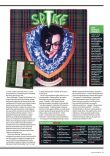 Costello was in truth all over the place, his restlessness and dissatisfaction with his career arc reflected in the welter of soubriquets he had adopted over the previous couple of years, and in his ceaseless changes of musical approach. Was this desperation in the guise of a questing spirit, or simply a loss of direction?
Both, actually. As he considered his first album for a new label, Warners, Costello's head swam with ideas. Apparently convinced that any genre was his for the taking, he envisaged a series of four, even five albums. There would be another Americana record with Coward Brother T Bone Burnett, a venture into New Orleans territory with some of the Crescent City's finest, yet another using the Irish folk flavours he enjoyed with The Pogues, and then a more mainstream pop album, possibly the McCartney project...
What emerged from these grand visions was Spike, a diffuse sprawl across genres, a fascinating and sometimes inspired collection that refused to become more than the sum of its parts. Its uncertainty is there in a cover shot of Costello in clown greasepaint — or is it music hall demon? — with "The Beloved Entertainer" inscribed below, yet another toyed-with alias, as if any but the most ardent Ellophile cared what nom de plume was currently in favour. It was all Costello, after all.
Not quite. Spike was the first Costello album with co-composer credits — a brace with McCartney, another with O'Riordan. It also boasts a giddy array of guests clustered around each of its several recording locations. The aristocracy of Irish folk graced the Dublin sessions — Dónal Lunny, Davy Spillane, Christy Moore. The LA studios drew Roger McGuinn, Mitchell Froom, Marc Ribot, Jim Keltner, with co-producer T Bone Burnett also lending a hand. New Orleans provided The Dirty Dozen Brass Band under the supervision of soul maestro Allen Toussaint. Back home there was a near-duet to be sung with Chrissie Hynde, and of course, somewhere, Nick Lowe was on bass. The sessions were a logistical jigsaw, with parts recorded in one city and augmented elsewhere. But if scattered, Spike was also fearless, Costello putting himself among the top brass of his profession.
Could he rise to the various occasions? Mostly. Opener "This Town" unrolls grandly with a chiming chorus of "You're nobody in this town until you're a bastard," with intriguing vignettes of modern-day bastardry in its verses. "Deep Dark Truthful Mirror," a potentially awkward mid-tempo piece of finger-pointing, is lent gravitas by Toussaint's rippling piano and the growls of the Dirty Dozen Brass. There's a wry joy to the cabaret of "Miss Macbeth," with its Beatlesesque Wurlitzer, while the actual Beatle presence delivers a highlight — and much-needed hit single — in "Veronica." Costello provided the song, about an old lady drifting into absent-mindedness, more or less intact, but Macca's added chorus swirls the song upwards into exuberance. The pair's other co-write, "Pads, Paws And Claws," is a less fortunate affair, a nondescript neo-rockabilly that never gets past its title.
Best of all comes "Tramp The Dirt Down," an elegant excursion into Irish balladry, simply and sweetly played by the doyens of the craft, cradling one of Costello's most vitriolic tirades, aimed not at a lover but at Prime Minister Margaret Thatcher. Costello's revulsion at the sight of the baby-kissing Iron Lady triggered the song, which contrasts her smiles with the miseries inflicted by her policies: "I never thought that human life could be so cheap." Reflecting a widespread loathing for her regime, its sentiments are delivered drily, or at least as dry as hoping to stamp on someone's grave can get. Only towards the end does Costello's voice crack with bile. Heaven knows what the world made of it, but in Eire and Albion the cheers rang. True to his word, Costello continued to sing the number after Thatcher's death in 2013.
"Any King's Shilling" allows the Celtic contingent more space to stretch out musically, and they produce a majestic arrangement for one of Costello's most impassioned vocals, cautioning a young man against "putting your silly head in that British soldier's hat"; it could as easily belong to the "troubles" of the 1920s as the 1980s.
Yet for every triumph on Spike there is a so-so counterweight. "Chewing Gum" is a stab at funk that's too strong for Costello's reedy vocals. "Satellite," with Chrissie Hynde backing, struggles to establish a clear identity. "Last Boat Leaving," written for The Courier, is a pleasant plod. "Let Him Dangle," about the last man to be hanged in Britain, is a well-meant polemic against the death penalty but one that, chorus aside, comes melody-free. "God's Comic," cut from the same cloth as Randy Newman's "God's Song," has some droll lines — EC imagines The Almighty listening to Lloyd Webber's Requiem and remarking "I preferred the one about my Son" — but its conceit and mock jaunty arrangement soon outwear their novelty.
Then there's "Stalin Malone," a beautifully played instrumental from The Dirty Dozen Brass, intricate yet catchy. Costello seems to have realised that fitting in an equally elaborate set of lyrics — sample: "the jazz band drowns out the hysterical bird" — would be inviting trouble, so the track stays gamely but oddly a stand-alone. One might say the same
of Spike as a whole; among Costello's huge output it's a one-off in its diversity, and if its contents don't quite coalesce, its stand-outs and bravery still shine.
|
|
The Juliet Letters
Andrew Mueller
Rock 'n' roll, where art thou? A confounding, undervalued hook-up with The Brodsky Quartet.
|
"This is no more my stab at classical music than it is the Brodsky Quartet's first rock and roll album," declared Elvis Costello in the (extensive) sleevenotes of the original release of The Juliet Letters. A measure of defensiveness was understandable. As Costello had learned the hard way, over 13 previous albums of restless reinvention and innovation, and the often bewildered and/or outraged response to same, rock fans — for all their rebel posturing — are often extremely conservative and possessive people.
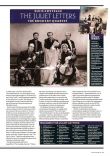 There was indeed reason to fear that those who would have preferred he never outgrew the sweaty, splenetic, knock-kneed, misanthropic punk rocker on the cover of My Aim Is True and This Year's Model might be other than welcoming of what was — and there was really no getting around this — an emotionally complex concept album made in cahoots with serious string players. Or, as a senior figure at one music weekly remarked when the first violin trills of the brief instrumental fanfare "Deliver Us" were broadcast across the office, "Has the King of Albania died or something?"
The suspicions engendered by The Juliet Letters were mostly to the effect that Costello was being deliberately and obtusely whimsical and/or insane and vainglorious and/or was making a clumsy and faintly pitiable attempt to be taken seriously. The last of these was convincingly debunked by Costello himself in the (even more extensive) sleevenotes of the 2006 reissue of The Juliet Letters ("Clearly, anyone who made such a statement had little or no knowledge of critical hyperbole that can rain down on even the slightest talent before the bloom goes off the romance in pop music. I had found myself being taken too seriously and over-analysed from the very outset of my recording career.") The other accusations were rather more a reflection on those making them than the object of them: imagination and ambition seem strange insults to level at any artist, or indeed anyone.
The more prosaic truth of the gestation of The Juliet Letters was that Costello had chanced across a newspaper article about a Veronese professor who had taken to replying to the correspondence the city apparently received addressed to Juliet Capulet. Costello, not unreasonably, was intrigued by the idea of what people might be writing to a fictional or at any rate long-dead character, and what one could possibly say in reply. At around the same time, he was entranced by The Brodsky Quartet's performances of Shostakovich's string quartets at Queen Elizabeth Hall in London, and over the next few years became a regular at their concerts — unaware, as he tells it, that the Brodskys had also been to see him play more than once. They began discussing working together in 1991, and The Juliet Letters was premiered in London and Dartington in the summer of 1992, after which the album was recorded, live in the studio.
The Juliet Letters is a punctiliously equal collaboration: Costello contributes to the music, the Brodskys to the words. For all that, The Juliet Letters, like few other Costello albums before or since — North is perhaps the only comparison — is dominated by Costello's singing voice. This is understandable — he'd cut that unmistakable serrated whine to be heard against vastly more clamorous backing. And it's mostly no problem at all, at least for listeners who have acquired what remains a divisive taste. His impersonation of a vindictive grandmother plotting disinheritance on "I Almost Had A Weakness" owes much to such previous sanctimoniously enraged outbursts as "Blue Chair" and "How To Be Dumb"; "This Sad Burlesque" is a descendant of such beard-era baroque triumphs as "All Grown Up" and "God's Comic," and his ominous muttering of "For Other Eyes" recalls "Pills And Soap" (a Brodskyfied version of which would form part of the encore at live performances of The Juliet Letters).
But the worst and best moments of The Juliet Letters are those at which Costello tries to find new voices for this new context. On "Swine," he affects a nasal, declamatory bark to suit a screed of deranged ranting ("You're a swine and I'm saying that's an insult to the pig"), but sounds perhaps too convincingly like a ragged-trousered itinerant barking at traffic outside an off-licence. Similarly, the hoarse barrow-boy yelp of "This Offer Is Unrepeatable" suits the chain-letter huckster narrating the lyric, but entices the repeat listener as little as spam of this sort ("Ignore at your peril this splendid advice") entices sane recipients. On a few other tracks, especially "Romeo's Seance" and "The First To Leave," Costello could perhaps have afforded to rein in his sometimes hyperactively tremulous vibrato just a little.
But when he properly hits it, he's magnificent. The creeping, obsessive "Taking My Life In Your Hands," the glorious show-stopper that heralded the intermission in live performances of The Juliet Letters, builds slowly and sumptuously to a crescendo that Costello surely has no hope of reaching, until he does, at which he suddenly resembles some seething, vindictive cousin of Bobby Hatfield (a compliment, in these circumstances).
The Brodsky Quartet are predictably extraordinary throughout, as capable of the stately and restrained ("The Letter Home," "This Sad Burlesque") as they are of the playful and poppy. "Jacksons, Monk And Rowe," for all that it was mostly written by the Brodskys' Michael and Jacqueline Thomas, would have fitted seamlessly onto one of Costello's more arranged albums — Imperial Bedroom, say, or Spike. It says much about the seamlessness of Costello's association with The Brodsky Quartet that it barely seemed remarkable when they did pop up on a couple of his subsequent albums, playing on a track each of All This Useless Beauty and North, or when Costello appeared on their Moodswings.
No Elvis Costello album has been so witheringly pre-judged as The Juliet Letters. It may be for that reason that it rarely features among lists of his best works. Indeed, it must be that, because there's not a lot wrong with the songs.
|
|
All This Useless Beauty
Jim Wirth
Dreams sour and midlife crises proliferate at The Attractions' muted last stand.
|
Not as bad as some would make out, the final Elvis Costello & The Attractions album is nonetheless the sound of a band going down without much of a fight. Originally conceived as a double album, the final new recording under Costello's Warner Brothers' contract eventually trundled out as a makeweight assortment, featuring several songs originally written for and recorded by other artists. Gravity is taking its toll on the fortysomething band. Rome is burning and no-one even bothers to fiddle that much.
"I took my better nature out, drowned it in the babbling stream," sings Costello, documenting his midlife crisis sourly on the quietly cosmic "Little Atoms." "Took the blossom of my youth and blew it all to smithereens."
That youth's final blooming was arguably 1994's Attractions reunion record, Brutal Youth — which has a strong case for being the strongest record of his career. With that last burst of skinny-tie bravado out of his system, All This Useless Beauty scrambles for a new purpose somewhat ineffectually, crushed by the burden of Costello's obvious disappointment at what his career — maybe even his life — had brought him thus far. "It seems to have been a time that was incredibly serious and rather wretched," he recalled in his sleevenote to the expanded reissue, adding equally sourly: "I was also drinking very large quantities of alcohol. That'll work for you every time if you really want to remain miserable."
Gloomy and inward-looking, it is a record about slipping into middle age with a combination of curmudgeonly stubbornness and cowardice. "Nonsense prevails, modesty fails, grace and virtue turn into stupidity," Costello sings on the title track, one of two unusually generous gifts he bestowed on Lorelei-voiced folkie June Tabor in the early 1990s, only to reclaim here.
"There were songs about betraying your principles, letting yourself down and being diminished," Costello recalled of the final tracklisting. "None of these lyrics contained any anger toward the characters, only disappointment that they had settled for so little. I could just as easily have been talking to myself."
"You Bowed Down" — written for ex-Byrd Roger McGuinn's 1991 solo album Back From Rio — is a case in point in that sense; a jingle-jangle mourning for cheaply sold ideals, Costello purring scornfully: "It must have hurt you to see how dreams sour."
The ridiculousness of second childhood masculinity is the central theme of "Poor Fractured Atlas" — which Costello regards as perhaps the finest Attractions recording — beginning with a guffawing rejoinder to Iron John wannabes. "He's out in the woods with his squirrel gun / To try to recapture his anger." However, it swiftly morphs into something a little more personal. "He's screaming some words at the top of his lungs / Until he begins to feel younger."
If that is another unflattering self-portrait, it is no great shock that Costello might have thought that another noisy Attractions album like Brutal Youth was somehow beneath his dignity, and certainly the music on All This Useless Beauty — and indeed much of what has followed since — represents a quest for something more refined than the four-square sound that made him. Rock 'n' roll is all but excised from "Starting To Come To Me" and the Cole Porter-ish closer "I Want To Vanish": further evidence of a quest for a music tailored more to the expanding waistlines and receding hairlines of dignified middle age. Tellingly, the next "proper" album Costello recorded after All This Useless Beauty was a collaboration with Burt Bacharach.
There is some more vigorous material — Paul McCartney collaboration "Shallow Grave," and "Complicated Shadows," written for Johnny Cash — but the general tone is subdued and stately, meaning that the rough-and-ready Attractions have remarkably little to get their teeth into. Drummer Pete Thomas and pianist Steve Nieve continue to back Costello as The Imposters, but bassist Bruce Thomas would never work with his old flatmate again after this record, blaming Costello's increasingly controlling manner — and the singer's relationship with then-wife Cait O'Riordan — for their artistic divorce. "Pete, Steve and EC are working happily together with a replacement bass player — presumably someone of a more malleable nature than his predecessor," Thomas said later.
Deciding to no longer keep his enemies close has not always been beneficial, and "It's Time," the penultimate track on All This Useless Beauty, suggests that Costello knows he can be lost without some tension. "If you do have to leave me," he wails desperately, "Who will I have left to hate?"
Such red-eyed rage is out of place among the autumnal tones of All This Useless Beauty; atrophic browns, equivocal greys. The fact that the best song — and opening track — on the album is probably the oldest of the lot is further evidence of this being a down period, emotionally and creatively, for Costello.
"The Other End Of The Telescope" was released on US college-rockers' 'Til Tuesday's 1988 album Everything's Different Now, having been written in collaboration with the band's singer, Aimee Mann. However, Costello returns to it with renewed vigour nine years on, piling on the bitterness into the original wistful folk-rock meander around a love affair rapidly running its course.
With the Scrooge-ish protagonist ruefully cradling "the cast-iron heart" that his lover "failed to tear open," it is one of the most nuanced deliveries of Costello's career, seemingly full of insight gained more by looking in a mirror than staring into an eyepiece. "You're half-naked ambition and you're half out of your wits," he notes at one point, adding in an unusual piece of self-soothing: "Your head is so sore from all of that thinking — I don't want to hurt you now, but I think you're shrinking."
The choice of title was a fair indication that Costello knew All This Useless Beauty was destined to be a footnote. A fist vainly waved at a departing bus.
|
|
When I Was Cruel
Jason Anderson
|
Jason Anderson reviews When I Was Cruel; Jason Anderson reviews When I Was Cruel; Jason Anderson reviews When I Was Cruel; Jason Anderson reviews When I Was Cruel;
|
|
The Delivery Man / Il Sogno
Nick Hasted
|
Nick Hasted reviews The Delivery Man and Il Sogno; Nick Hasted reviews The Delivery Man and Il Sogno; Nick Hasted reviews The Delivery Man and Il Sogno; Nick Hasted reviews The Delivery Man and Il Sogno;
|
|
|
